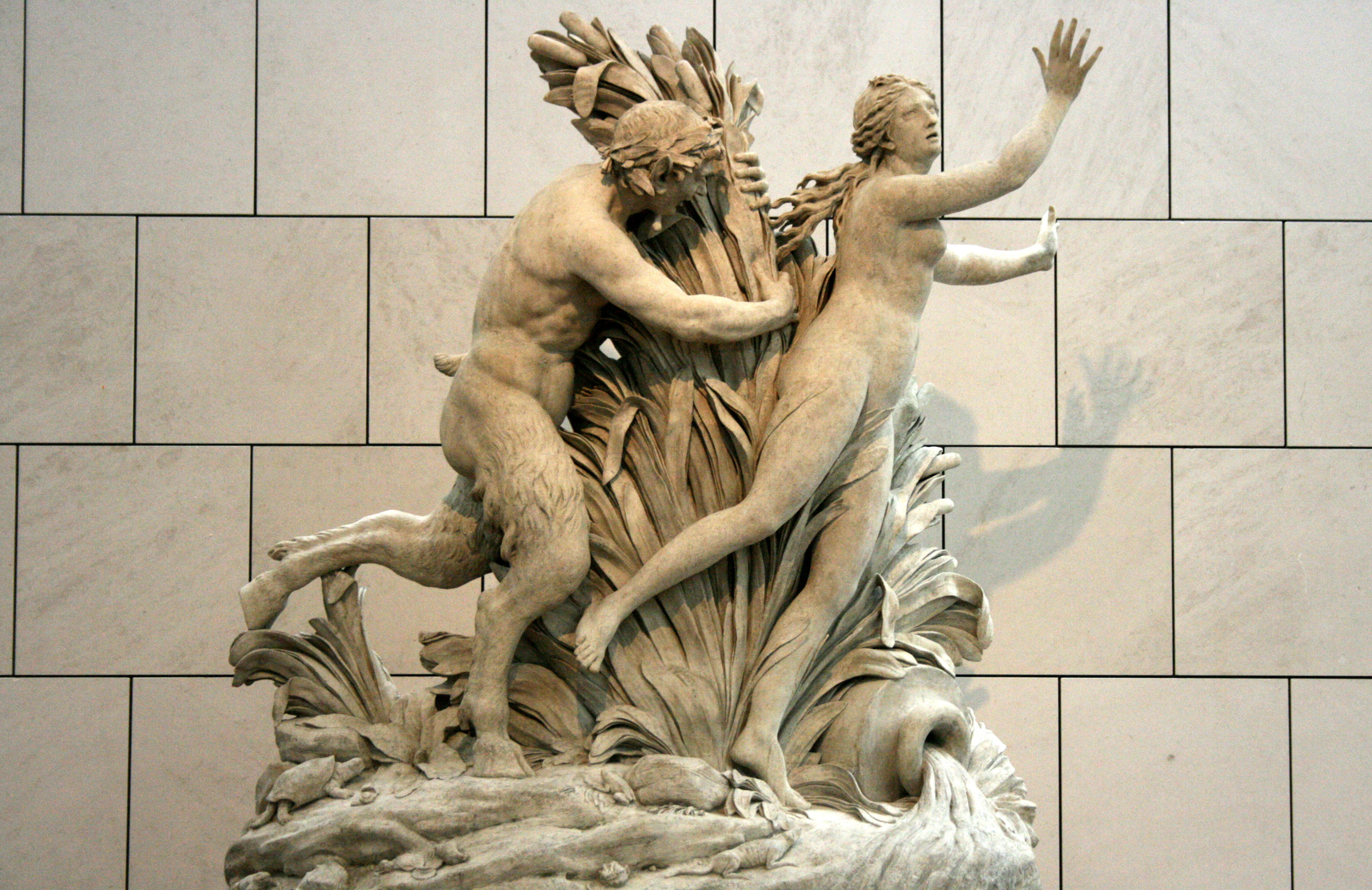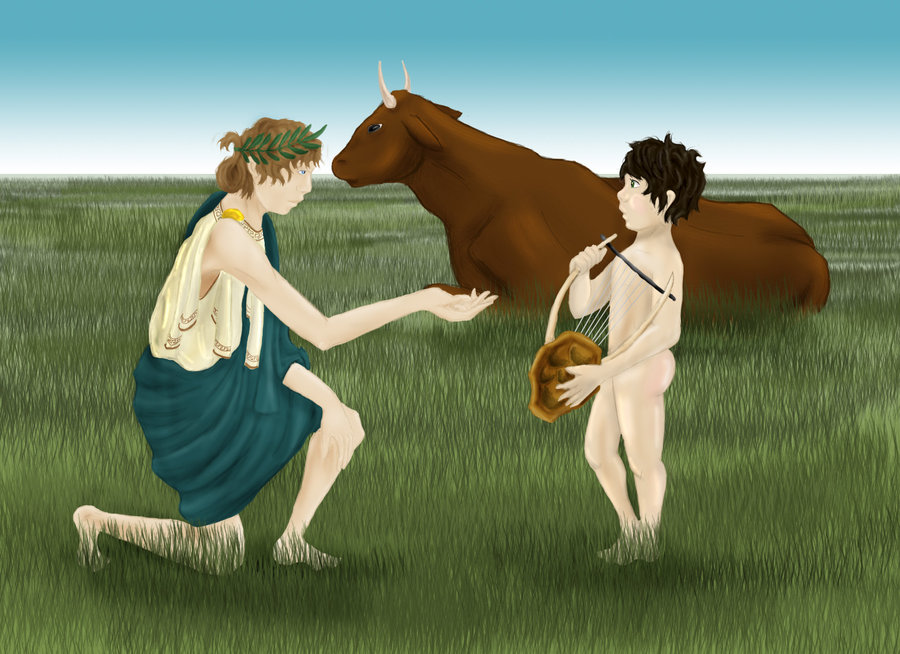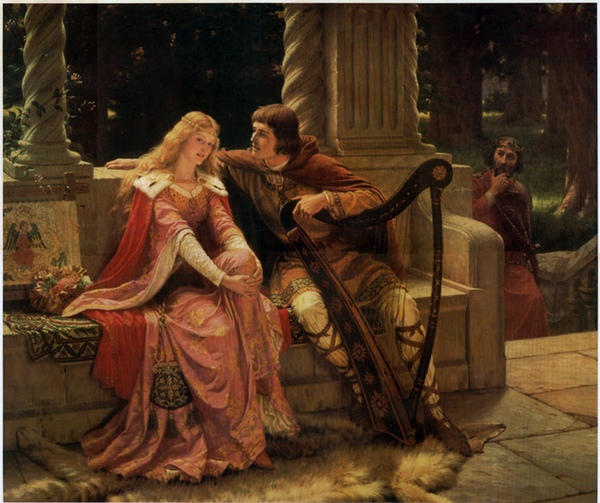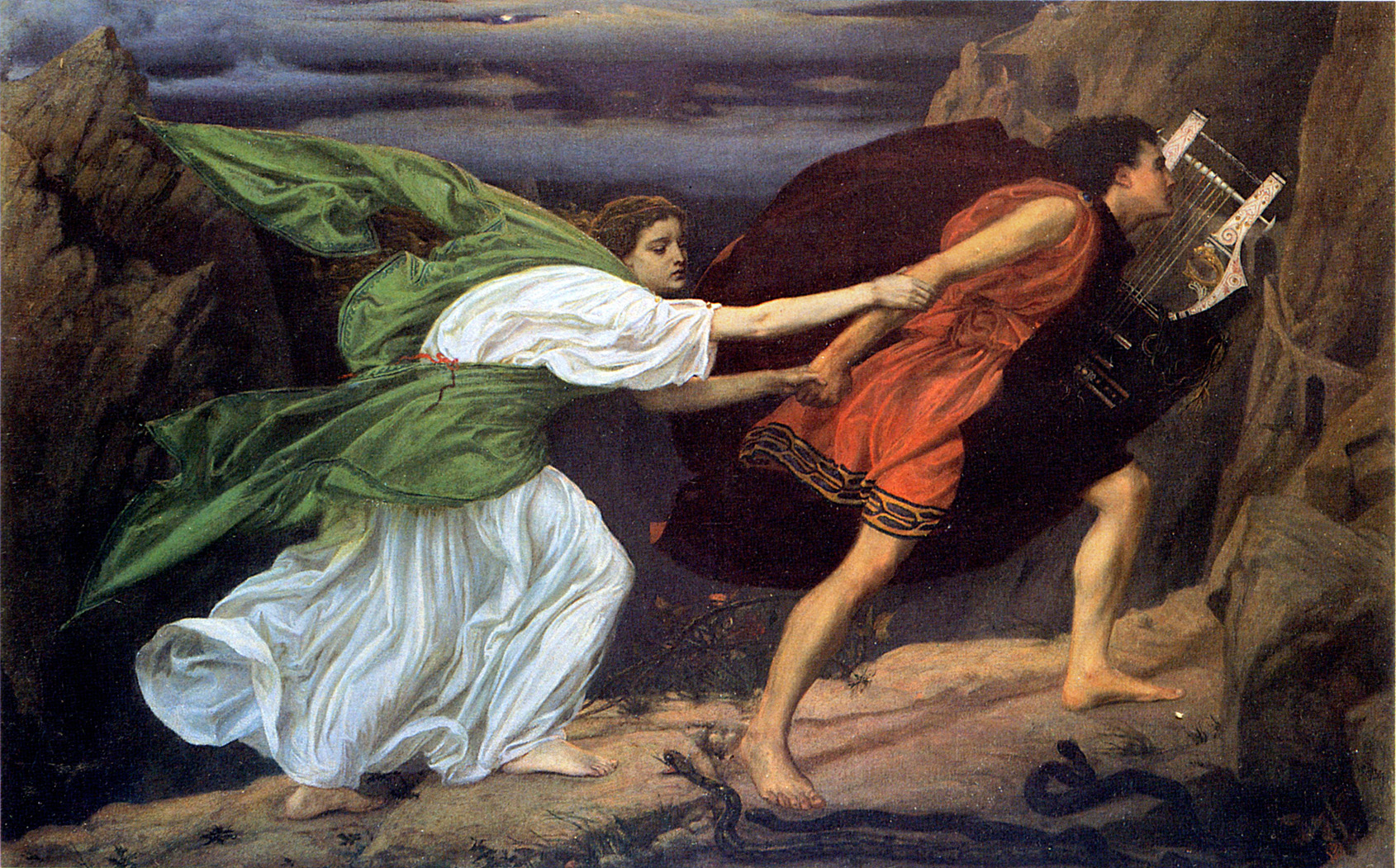Gods and music: Bad things happen to good people
Ancient myths prove, if you call that proof, that competing with the gods or the muses, or any kind of supernatural creature for that matter, in a musical challenge can prove quite the deadly task. If, for any reason, you decide to show off your god-given musical talent, just remember who gave it to you. Okay, if you know your myths well, you’ll probably think of a few exceptions. But chances are, when music is played, people will end up dead, burned, skinned, polymorphed, brokenhearted or, if they’re lucky, banished to the underworld for eternity.
Remember “The Gods Must Be Crazy”? Good movie. Anyone who has even a vague idea of the atrocities gods have committed towards mortals just because of music, can testify “crazy” is a serious understatement. Just listen to these happy testimonies:
The harp of order, that accidentally killed some guys
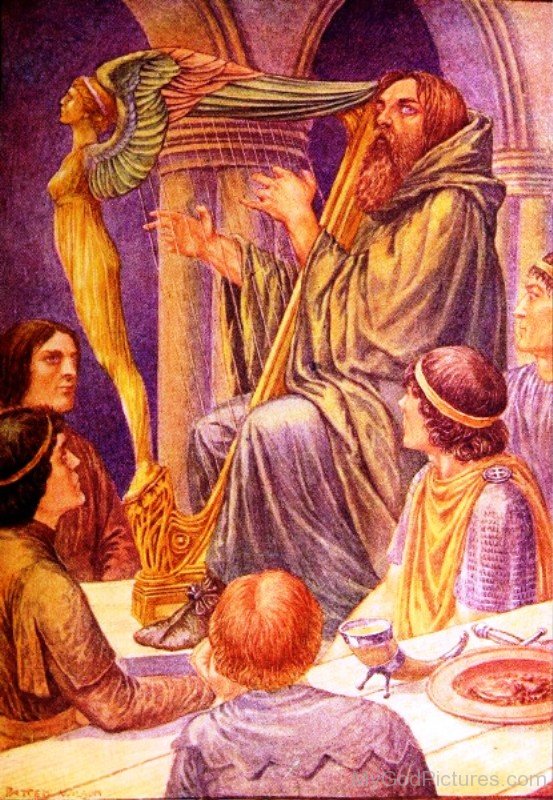 Instrument
Instrument
Uaithne, a.k.a. Dur da Blá, “The Oak of two blossoms” or Coir Cethar Chuin, the “Four Angled Music”, was a harp. It could put the seasons in the correct order (because apparently they were very confused about it for some reason). It could also command order in battle. Order seems to have been its thing…
Owner
The Dagda – a fatherly god in Irish tradition, protector of the tribe.
Victim(s)
Nine innocent people. That we know of.
What happened?
The harp was stolen by some guys called the Fomorians after the second battle of Mag Tuired, which was, probably, a random but very important event we don’t really want to bore you with. What the poor bastards didn’t know was that the Dagda had bound Uaithne so it would not make a sound until its master would call it. Unfortunately for them, it was also very eager to return to its original owner. All the Dagda had to do was call the instrument and it sprang from the wall, killing nine people on its way to its master. Poor souls. This goes to show that stealing is bad.
Pan’s kinky flute, a.k.a. the panflute
Instrument
The panflute or simply Pan’s flute. It was fashioned from hollow reeds.
Owner
Pan, god of the wild, shepherds and flocks, nature of mountain wilds and rustic music, and most importantly, “companion of the nymphs”.
Victim(s)
You guessed it, a nymph. Syrinx was her name. She was a water nymph of Arcadia, the daughter of the river-god Landon.
What happened?
Pan, that naughty old satyr, met Syrinx one day when she was returning from a hunt and immediately decided he had to have her. Sensing the god’s seductive intentions, she tried to escape by joining her sisters, who came up with the brilliant idea of turning her into a reed. Pan, still fairly infatuated, couldn’t tell one reed from the other. So he took some pieces and put them together in decreasing heights, as if that would solve anything – gods are just weird like that. Thus, the panflute was born, also called a “syrinx”, named after the horned god’s beloved nymph.
The first lyre, a.k.a. “if you’re a god, you can get away with anything”
Instrument
The first lyre, made from the shell of a tortoise and a few strings.
Owner
Hermes, son of Zeus and Maia, the quick and cunning god of transitions and boundaries. Able to move freely between the worlds of the mortal and divine, he was emissary and messenger for the gods and conductor of souls into the afterlife.
Victim(s)
Justice. And all mortals, indirectly.
What happened?
Just a few hours after his birth, Hermes tried to steal some oxen from his brother Apollo. That’s just how gods work, I guess. On his way to his brother’s herd though, he stumbled upon a particularly distracting tortoise. Naturally, he killed it and basically invented the lyre, immediately being able to play with great skill. Of course, he got bored quickly, as you would, and put the instrument in his cradle. He succeeded in stealing the oxen from Apollo which led to a conflict, somehow resulting in both gods ending up in Hermes’s room. The gods’ emissary managed to play a chord on his lyre, which left his brother mesmerized. Apollo immediately forgot about the theft and told his brother he could have dominion over herds and flocks in exchange for the beautiful lyre. Oh, and he got to keep the oxen. I know, right?
The harp that could play The Song of Life
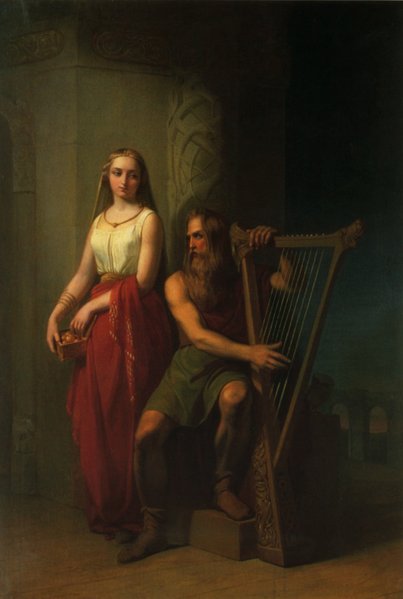 Instrument
Instrument
A golden harp that could play The Song of Life. Pretty neat.
Owner
Bragi, son of Odin. You at least know who Odin is, right?
Victim(s)
No one, really. It’s just a cool story. Well, maybe the people who weren’t born gods and actually have to work hard to achieve something in life. And the dwarf of death got a little screwed but that’s not that bad, is it?
What happened?
So, Bragi got a gift from the dwarves upon his birth – a golden harp. He was then sent out to the world on one of their vessels. You would think that’s not the most responsible thing you can do to a newborn but, of course, Bragi managed the situation brilliantly, as only a god could. He had barely shown any signs of life, when all of a sudden he sat up, grabbed the harp and started singing the song of life. Apparently, this was a big deal, because when his vessel was cast ashore and he set foot on the land of the dwarf of death, still playing the golden harp, the grass filled with beautiful flowers and trees started to bud and bloom. There, Bragi met the goddess of immortal youth – Idunn, and together, they journeyed to Asgard. Odin put runes on his son’s tongue, making him the official composer and bard of the gods, tasked with singing songs to praise them and the heroes of Valhalla.
The random harp which caused legendary suffering
Instrument
A generic harp.
Owner
Tristan, a distinguished knight from Cornwall. Yep, the one from the legend.
Victim(s)
Himself and Isolde, also the one you’ve heard of.
What happened?
You’ve certainly heard the story of how the two lovers drank a love potion disguised as poison. But did you know that their fates were intertwined long before? King Mark of Cornwall was asked by Morholt – Irish duke and a huge, powerful knight – to pay him tributes. So Tristan bravely decided to solve the issue by challenging Morholt to a duel. This turned out to be a good idea as Tristan ended up winning the battle but was badly wounded by the duke’s poisonous blade. Ironically, the only person who could heal his festering wound was Isolde the Elder – Morhold’s sister. Now, depending on which version of the story you read, either she or her daughter, Isolde the Fair, did the job and Tristan managed to return back home. What’s important is, since he had personally murdered one of the two Isoldes relatives, he disguised himself as a harpist named Tantris and his talent was so great, young Isolde was fascinated and wanted to learn how to play too. This, of course, set in motion a series of tragic events you’ve all read about.
The lyre which was apparently more valuable than the man who played it
Instrument
The famous lyre of the famous Orpheus. Possibly the most epic lyre ever.
Owner
The legendary Orpheus, Greek musician, poet and prophet.
Victim(s)
The legendary Orpheus, Greek musician, poet and prophet, AND his wife.
What happened?
Eurydice, Orpheus’s beloved, was taking a stroll through the tall grass on their wedding day when a satyr saw her. We already learned that being stalked and chased by a satyr can prove to be a nasty experience. Well, Eurydice knew this as well so she ran, only to trip and fall into a nest of poisonous vipers and get bitten to death. When Orpheus found her body, he started playing his lyre with such grief, that all the gods and all the nymphs felt his heartache and started to mourn. They sent him to the underworld where, again, he played his lyre. So beautiful was his music, Hades and Persephone felt his pain and agreed to let him take his wife back to the upper world on one condition – he had to walk in front of Eurydice and not look at her until they’ve left the underworld. Unfortunately, Orpheus was an awe-inspiring musician who could make the gods weep but, turns out, not a very bright person – he impatiently looked at his lover as soon as she appeared in the underworld, causing her to cease to exist forever.
This story is sad enough already but the ending is really worth the wait, if you’re a fan of gods being weird and stupid. According to Ovid, after what happened, Orpheus decided not to take any more female lovers and turned his attention to young boys instead – gross but also super fine in ancient Greece. The Ciconian women, followers of Dionysus, were particularly enraged by the poet’s rejection. They tried the good ol’ sticks and stones technique but whatever they threw at him, just bounced off, refusing to harm him for his music was SO beautiful. This, of course, didn’t stop the frenzied women, who just attacked Orpheus with their bare hands and tore him to shreds. For some supernatural reason, his head and lyre not only survived, but were still able to produce incredible music as they floated down the river Hebrus, washing up on the Mediterranean shore, finally reaching Lesbos. The locals buried his head and his lyre was taken by the Muses who carried it to the skies and put it among the stars.
While this is all very poetic, it proves a few major points. Instead of saving Orpheus, who was actually the one who created the amazing music everyone was crazy about, the supernatural forces figured it would be best to preserve his lyre in heaven instead (they had the power to do both, obviously). But seriously, people were very, very different a long time ago and mythological thought is almost incomprehensible to us nowadays.
Anyway, we learned our lesson today: gods and music just don’t mix well together. And while one may argue that sometimes it is the deeds of mere mortals that cause pain and suffering, it’s good to have in mind that somewhere, probably up above, there’s a god planning with his friends a horrible fate for you right now. This, however, shouldn’t stop you from making music 🙂


